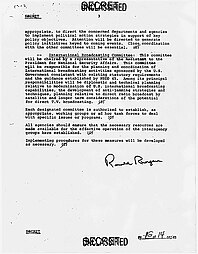National Security Decision Directive 77

NSDD77
|
|
| Author | United States National Security Council |
|---|---|
| Country | United States |
| Language | English |
| Published | January 14, 1983 Federal government of the United States |
| Media type | |
| Pages | 3 |
National Security Decision Directive 77 (NSDD-77; titled Management of Public Diplomacy Relative to National Security), was a U.S. National Security Directive signed on January 14, 1983 by President Ronald Reagan. The directive established a Special Planning Group (SPG) under the National Security Council (NSC) whose purpose was to strengthen, organize, plan, and coordinate public diplomacy of the United States relative to national security. This NSDD positioned the White House and the National Security Staff at the helm of public diplomacy coordination across government agencies. NSDD-77 lay the groundwork for the Reagan administration's aggressive public diplomacy strategy and included guidance for inter-agency working groups to execute wide ranging tactics for information dissemination both domestically and internationally.
A National Security Decision Directive (NSDD) is a kind of Presidential Directive in which a President gives instructions to senior advisors and departments concerning matters of national security.
Public diplomacy and international information programs have been used as instruments of foreign policy since World War II. The Department of State began sponsoring educational and cultural exchanges as early as the 1930s as a method of combating German influence in Latin America. The CIA sponsored Radio Free Europe/Radio Liberty (RFE/RL) in the 1950s to broadcast messages into the Soviet Bloc. The aggressive public diplomacy initiatives created under the Truman and Eisenhower administrations were not pursued by subsequent administrations until President Reagan in the 1980s. The Reagan administration's dedication to public diplomacy as a tool of foreign policy during the Cold War was unprecedented. Carnes Lord, a principal author of NSDD 77, stated that the "beleaguered and defensive bureaucracy was infused with money, high-caliber personnel, and a mandate, and for the first time in many years was admitted to an administration's inner councils. It is also important to underline the personal involvement in public diplomacy operations, not only of the president himself, but of other senior administration policy officials."
President Reagan's background as a Hollywood actor, and later governor of California, provided him with access to many powerful individuals with backgrounds in communications, advertising, and entertainment. President Reagan appointed longtime friend and Hollywood financier, Charles Z. Wick, to head the USIA and Frank Shakespeare to chair the Board of International Broadcasting. This team of communication experts, many lacking any significant experience in Washington, enabled the Reagan administration to conceptualize and execute many revolutionary and risky tactics in their shaping of an effective public diplomacy strategy. Dr. Lord goes on to explain, "the strategic framework of the Reagan administration's public diplomacy effort featured among other things, direct engagement with Soviet propaganda and disinformation, democracy promotion, and revitalization of U.S. international broadcasting."
...
Wikipedia
